The Last Temptation of Christ, 1988, directed by Martin Scorsese, screenplay by Paul Schrader, from the novel by Nikos Kazantzakis.
A little thought experiment. As I write this, Spiderman 3 has grossed $754,924,527 worldwide. It's one of the most successful movie franchises in history. And anyone will tell you that's because most people are already familiar with the characters (it certainly wasn't because the movie was any good). Spiderman has great mental real estate. But imagine if it had the kind of mental real estate the Bible has. Nearly 40% of Americans would attend weekly meetings to listen, discuss, think, and sing about Spiderman. Children would be taught simplified versions of the Spiderman stories from the moment they could understand language. For centuries, virtually all Western art would use themes, characters, and images from the Spiderman stories. There'd be a constant battle to keep Spiderman out of the public schools—at least for those of us lucky enough to live in a nation founded on a separation between Spiderman and state. And Mitt Romney would keep saying that America needs a to be led by a "person of Spidey-Sense." So to a casual observer, Biblical movies should be a no-brainer for both studios and filmmakers. Then why are there so few, and why are they so boring?
The problem is that Biblical stories, paradoxically, have too much mental real estate. The guys who flood message boards with posts about how "SAM RAIMI IS TEH SUXXOR" because he didn't exactly follow the story from the original comic books have nothing on Jesus fanboys; those guys firebomb theaters. But even if you appease the fanatics, you have to deal with the lukewarm, neither cold nor hot.1 Most people are convinced that they already know the Bible.2 For the most part, church is popular because it's part of the social fabric of many communities, not because it's spiritually challenging. So to engage an audience, a filmmaker has more to overcome than someone making a completely original story; he or she must shock the audience out of their complacent relationship with their faith, convince them they're seeing something new and interesting. Without shocking them enough to get anyone killed. Some filmmakers approach this through spectacle; this is the approach taken in The King of Kings and most of the biblical epics of the sixties. Some filmmakers go the opposite extreme; Pasolini's The Gospel According to St. Matthew is nearly neo-realist. Some filmmakers take refuge in the bizarre. And some filmmakers turn the gospels into torture-porn. In The Last Temptation of Christ, Martin Scorsese took an approach closer to Pasolini than De Mille. In the process, he created one of the most engaging films about faith ever made. But all anyone remembers is that he pissed off the fanboys.
Scorsese opens the movie with a shot of some reassuring stunt-casting:
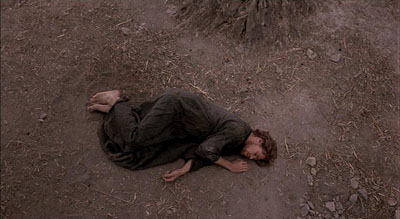
That's Willem Dafoe as Jesus. Light hair and eyes, European features; he's of the plaster saint school. In fact, this is doubly soothing, because audiences had just seen Dafoe in a similar role:
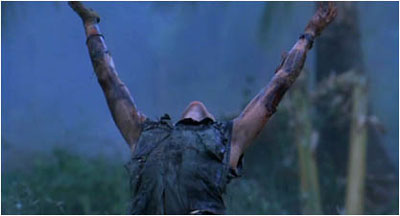
So despite Dafoe's slightly disquieting voiceover ("Claws slip underneath the skin and tear their way up. Just before they reach my eyes, they dig in."), we're in familiar territory here. The next shot is similarly relaxing:
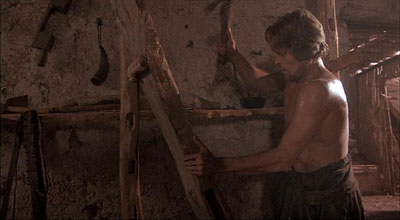
It's Christ as carpenter. Although he's not a pioneer of furniture design like Gibson's Jesus, this is about where the audience sits back and relaxes, preparing for a Sunday morning nap. Which is when Judas tears into his house:
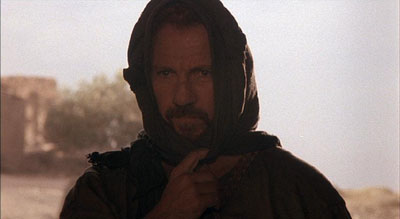
It's Harvey Keitel, playing the worst lieutenant. And then we find out what Jesus' carpentry project was about:
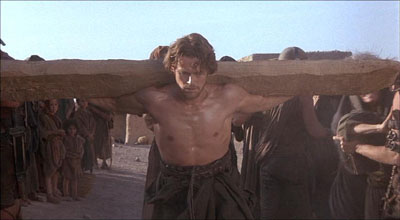
In this version of the Gospels, Jesus is making crosses for the Romans. As part of a campaign to avoid his own destiny. As he puts it:
God loves me. I know he loves me.
I want him to stop.
... I want him to hate me. I make crosses so he'll hate me. I want him to find somebody else. I want to crucify every one of his messiahs.
To say that this is a unique portrayal of Christ before he begins his ministry would be an understatement. Jesus' character in The Last Temptation of Christ is not unique in cinema, however. On the contrary, this Jesus is a familiar type: Rick in Casablanca, Schindler in Schindler's List. He's what Jim Shepard calls the "hero in disguise." There's never any real doubt that Christ will take up his own cross.3 But it takes him a while to get there.
The early structure of the film is surprisingly simple: Jesus meets three spiritual leaders who refine his theology and redirect his mission. The first is a monk of sorts named Jeroboam,4 who redeems Jesus from his apostasy and convinces him to begin preaching. Jesus sees his relationship with God as a curse, but Jeroboam envies him:
I don't know what God wants from me. All my life I've wanted to hear God's voice. I've dedicated my life to him. Sometimes I think I feel him, but I'm never really sure. But you always know.
After this meeting, Jesus begins his ministry, preaching a modernized version of the Sermon on the Mount that ends in chaos when the crowd interprets his message to basically mean "Eat the rich." Worried that he has misunderstood his mission, he meets with John the Baptist. The film's version of the voice crying in the wilderness is kind of a permanent revivalist meeting:
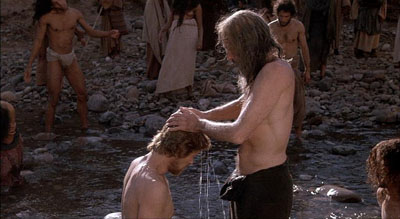
After John advises Jesus that he must not only love righteousness but hate wickedness, Jesus is tempted in the desert and returns ready to destroy evil, looking like a Greek Orthodox icon. Here's one of the cinematographer Michael Ballhaus's most painterly shots:
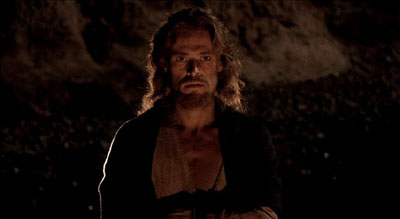
If the audience isn't 't already thinking of iconography, this scene ends with the sacred heart itself:
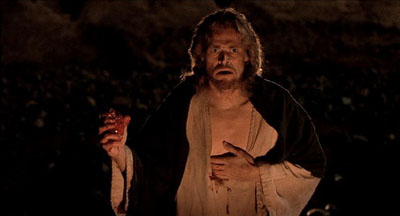
From here on out, Jesus styles himself as a political and religious revolutionary: he makes his first visit to the Second Temple5 and throws out the money changers. But this is also not his destiny, which is finally made clear to him by the prophet Isaiah, played by Martin Scorsese himself:
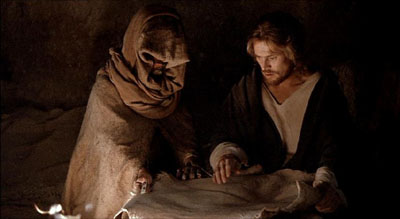
Isaiah makes everything clear to Jesus, and from here on out we're on more or less secure theological ground. Jesus returns to Jerusalem, causes a scene at the Second Temple, has some bread and wine, and you know how the story ends:
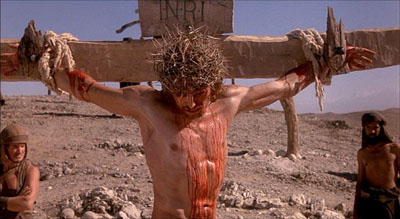
You can't write about The Last Temptation of Christ without addressing the film's critics; unfortunately, their arguments are mostly theological, not cinematic. So: theology. The Last Temptation of Christ occupies a kind of middle ground between textualism and, well, something else. As in any biopic, some of the chronology is rearranged to suit the structure (and the larger theme of Christ as someone who refined his mission as he went along). The imagined purification scene with Jeroboam takes the place of Jesus' meeting with John the Baptist in the original Gospels (probably because adding a wholly imagined scene that led to Christ becoming "angry Jesus" would have been harder to swallow). But the chronology shouldn't be that big a deal; John doesn't agree with the synoptic Gospels, either. There are three more serious theological problems with The Last Temptation of Christ. I think all three can be reconciled, but I don't really have a dog in this hunt, so take my opinion with a pillar of salt.
The first—and the one that got all the press—takes place during the "Last Temptation" of the title. In Scorsese's film, Satan appears to Jesus while he is on the cross, in the guise of a young girl (Juliette Caton, who later played Heidi in Courage Mountain):
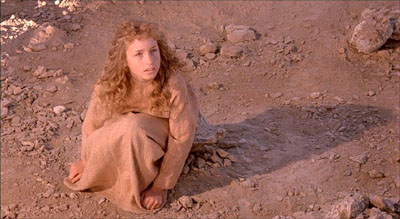
She tells him that his sacrifice was merely a test of loyalty, like Isaac's: God is pleased with him, and no longer requires him to suffer. He is not the Messiah, not divine, and may live a quiet life as a man. Her dialogue is exquisitely written to be seemingly soothing but have uneasy resonances (e.g., on the beauty of God's creation, "Maybe you'll find this hard to believe, but sometimes we angels look down on men and envy you. Really envy you."6). Jesus is given the opportunity to grow old and happy, and takes it. With that opportunity comes Magdalene, who has a different role this version of the story. Here, she is not someone Jesus meets during his minstry, but a childhood friend whose love Jesus rejected as a young man. She's played wonderfully by Barbara Hershey:
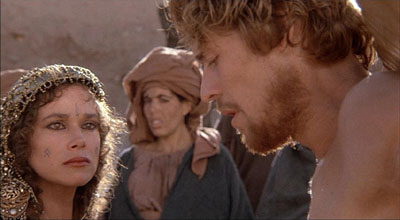
Now that he is no longer the messiah, Jesus marries her. After her death he has children with Martha and Mary, and grows old with them:
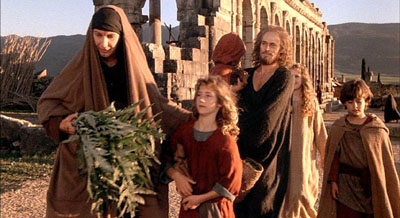
During this time he embraces an incrementalist view of salvation
This is the way the Savior comes. Gradually, from embrace to embrace.
and explicitly rejects his earlier views, telling the angel,
I'm ashamed when I think of it... Of all the mistakes I've made. Of all the wrong ways I looked for God.
This is an interesting theological viewpoint, and a human one. But as Judas tells him, "What's good for man isn't good for God." God, as any Young Earth Creationist will tell you, is a cataclysmist. Fittingly, Jesus realizes he has been deceived during a cataclysm, the destruction of the Second Temple. He begs God for a second chance and his life after the crucifixion is revealed to have been a hallucination; he dies on the cross, redeeming man. None of this strikes me as heretical; Satan showed Jesus all the kingdoms of the world in the desert, so he could certainly tempt him with domestic life. People were particularly shocked by a single shot in this sequence, however:
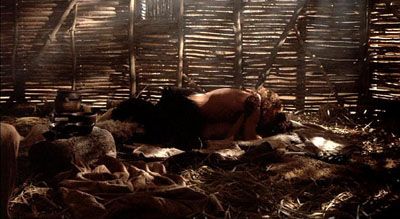
Saying "Jesus married Magdalene" is one thing, but showing them making love has a certain visceral punch to it that angered the faithful. Again, I don't think this provokes much legitimate theological controversy, as it's part of a temptation (and not just that, but one that occurs at Jesus' moment of greatest spiritual doubt, between "My God, my God, why hast thou forsaken me?" and "It is finished"). Still, this was the focus for much of the outrage that greeted The Last Temptation of Christ. Never underestimate the power of images. Ironically, focusing outrage on this scene was almost certainly a tactical error for fundamentalist critics of the film. Universal was able to characterize the fundamentalists as Puritans, offended by some theologically non-problematic sex (not only is Jesus fully human in this scene, he's married, and not only that, but it's a hallucination, and a temptation, and the image is created in Jesus' mind by Satan himself, and Jesus rejects it absolutely).7 The movie has two other fundamental heresies that were more or less ignored in media coverage of the controversy.
The most obvious is the film's treatment of Judas. The film's Judas is Jesus' first and most faithful disciple, the only one who realizes the meaning of his sacrifice. Scorsese has Jesus beg Judas to betray him so that he may fulfill Isaiah's prophecy and reconcile God and man ("Without you, there can be no redemption"). You can make a scriptural case for this. Jesus knows he is going to be betrayed by one of his disciples, and at least in John, he embraces this, telling Judas, "That thou doest, do quickly." But both the Bible and church doctrine seem pretty clear that this was a betrayal, not a heroic act. In fact, The Last Temptation of Christ's version of Judas is very close to one of the earliest heresies, denounced by Irenaeus of Lyon in the second century. A group of Gnostics were, like Kazantzakis, Schrader, Cocks, and Scorsese, claiming Judas had the clearest understanding of Jesus' mission on earth; they produced the recently-unearthed Gospel of Judas.8 But Judas's place in Christian cosmology doesn't stir up the faithful as much as the idea of Jesus having sex. And the water is murky here anyway; the Church has never officially proclaimed Judas is in Hell.
The strongest theological argument against The Last Temptation of Christ is the doctrine that Jesus lived without sin. It's obvious that the film's Jesus sins; he tells Jeroboam this quite explicitly.
I'm a liar. A hypocrite. I'm afraid of everything. I don't tell the truth—I don't have the courage! When I see a woman, I blush and look away. I want her, but I don't take her, for God, and that makes me proud. Then my pride ruins Magdalene. I don't steal, I don't fight, I don't kill. Not because I don't want to, but because I'm afraid.
Now Matthew has Jesus say "whosoever looketh on a woman to lust after her hath committed adultery with her already in his heart." So Jesus is in trouble here, never mind building crosses for the Romans. It comes down to what you think it means to say that Jesus was both fully human and fully divine. In the synoptic Gospels, there's no mention that Christ was sinless. But in John, written later, he is called without sin (only once). By the time Paul rolls around, however, this is church doctrine. The movie is aware of this problem and makes a familiar argument: Paul's version of Christianity is not Jesus'. It makes the case in a non-conventional way, however, through a clever bit of casting.
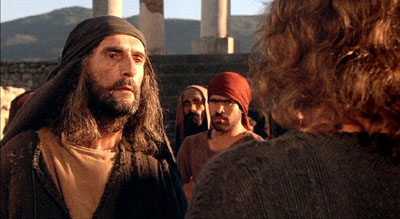
Call it the Harry Dean Stantonian Heresy. Scorsese has Jesus actually meet Harry Dean Stanton's Paul during his vision of life after the cross, and Paul tells him in no uncertain terms that he feels free to reinterpret his teachings as he sees fit:
I created the truth out of what people needed and what they believed. If I have to crucify you to save the world, then I'll crucify you. And if I have to resurrect you, then I'll do that, too. ...You don't know how much people need God. You don't know how happy he can make them. Happy to do anything. He can make them happy to die and they'll die. All for the sake of Christ. Jesus Christ. Jesus of Nazareth. The Son of God. The Messiah. Not you. Not for your sake. You know, I'm glad I met you. Because now I can forget all about you. My Jesus is much more important and much more powerful.
Of course, it gets complicated, because Paul is right; it's the resurrected Jesus who matters. And this is a dream anyway. But if you accept that Paul's version is modified, and that his main doctrinal addition was Jesus' sinless purity, you can reconcile Scorsese's Jesus with the man from the synoptic gospels. In all three, Jesus chastises a man who calls him "Good Master," saying, "Why callest thou me good? none is good, save one, that is, God." Still, if you believe Paul's writings are divinely inspired, casting Harry Dean Stanton is unlikely to convince you otherwise.
So that's the theology; what about the film? Many people had problems with the casting and the accents. Harvey Keitel speaks like, well, Harvey Keitel, with a pronounced New York accent, as do the apostles. This may seem crazy, and the movie took a lot of heat for it, but it was a conscious choice. Scorsese says on the commentary track that the traditional approach here here, using the language of the King James translation, wouldn't work because, "if the audience heard that language, and heard a British accent, they could be safe, they could turn off. it's just a Biblical movie." Scorsese, Schrader, and Cocks wanted to engage the audience more directly. That's why the dialogue echoes the Bible but almost never quotes it directly. And as Schrader puts it, colloquial English is "as appropriate as King James's language. It's not as appropriate as Aramaic but you're not gonna get Aramaic." I like to think Mel Gibson heard this commentary track and said to himself, "Oh, yeah?" For the most part, for me, the colloquial English worked the way it was supposed to. For one thing, giving the lower-class apostles New York accents sets up a nice contrast when the Pontius Pilate shows up, with a British accent. It creates the same cultural divide that Aramaic and Latin do in The Passion of the Christ. It's the Rebel Alliance/Galactic Empire school of dialogue coaching, and it works very well here. Of course, it doesn't hurt that Pilate is a million times cooler and more aristocratic than anyone else in the movie:
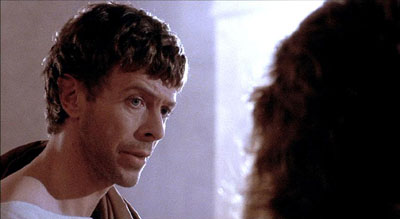
Yes, that's David Bowie, the man who was cool enough to make even Zoolander seem sophisticated. When Jesus tells him his kingdom is "not here. Not on earth," he replies, "It wouldn't be, would it?" Too, too dry. Bowie's Pilate is a pragmatist, but actually more involved in Christ's death than he is in the Bible; Barabbas isn't in this version. Instead of washing his hands, Pilate tells Jesus, "It simply doesn't matter how you want to change things. We don't want them changed." This puts Jesus back in the social revolutionary mode, at least from the perspective of the ruling class, and while it's wrong for Pilate, this is pretty much the attitude Caiphas and company have in the Gospels. So on the whole, I think the language works. Like any biopic, the script has a few awkward moments; the worst is Jesus saying, "Go back to sleep. Judas and I are talking."9 But I think this is an acceptable price to pay for the way the dialogue engages the audience directly, and forces us to think about the meaning behind speeches we've heard hundreds of times before.
The cinematography, as you've probably noticed, is brilliant. This is the first film in which Scorsese really used exteriors, and he masters it quickly. Christ's temptation in the desert is a particular standout:
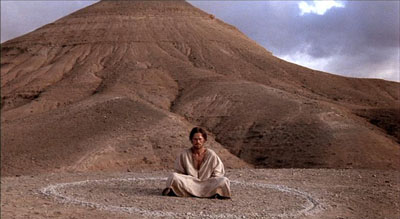
More than just being beautifully shot, Scorsese makes Jesus' world seem realistic in a way that every other Biblical epic I've seen has utterly failed to do. Even Gibson, with his painstaking verisimilitude, produced a world in which everyone seemed to be bathing regularly. And Gibson's version of the Second Temple misses out on something I would think he would have seized on: at the time, services revolved around Korbanot (that's why people were selling doves right next to the moneychangers). The Last Temptation of Christ gets this detail right, down to the drainage system:

The effect is of a deeply ancient and foreign world, but thanks to the language, a world we are forced to confront directly. This is mirrored in Peter Gabriel's magnificent score, which blends traditional instruments with synthesizers. The result is spiritually affecting, though not exactly in the way Scorsese might have wished. Listening to the commentary track, it is clear that Schrader and Scorsese had a fundamentally different view of the purpose of the project. Scorsese talks about it as though it is simply a different way to tell the life of Jesus, his version of the Gospels. Every technique he describes serves that purpose, making the audience directly involved in Jesus' life story, explicitly as a way of spreading faith. In this sense, he was engaged in the same project Gibson was. For Schrader, the goal was more complicated. Early in the commentary, he says that the real blasphemy in the story was not theological, but the idea of using "Jesus Christ as a metaphor." If you see The Last Temptation of Christ as an allegory about the struggle between the sacred and profane in human lives, the whole project becomes suddenly, blindingly clear. The point is not that Jesus went through this suffering so that we never have to; rather, the movie is about embracing the difficult, great thing you have inside you, instead of the smaller, easier paths that blur your road. Jesus does everything he can to avoid his destiny because this is what is easiest. It's worth noting that this is also true in the Gospels, in Gethsemane. In the end, however, and at great cost, he does what he knows he is capable of, and becomes the best version of himself.
For me, it all comes together when Jesus returns to Jerusalem for Passover. Scorsese opens with close shots of the disciples, who are anxiously discussing what's about to happen to them. Peter approaches Jesus and asks him, "Will there be angels there to meet us? Or anyone, besides who's here?" Jesus gives him a smile, and puts his arm around him, just as Peter Gabriel's score switches to the relative major10 and becomes nearly transcendent. Shortly thereafter, Scorsese sets up a magnificent tracking shot, which puts us behind a row of stalls and people waving palms; in the distance, we move along Jesus riding triumphantly into Jerusalem. Just when I was convinced Scorsese had decided we would only see this moment from a distance, as part of the crowd, the camera veers into the Temple entrance, and Jesus rides right toward the camera:
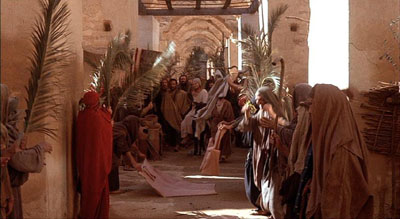
This is how we are meant to welcome the better angels of our nature. We were not born to hide behind others, nor to run away from our talents. We have a responsibility to make the necessary sacrifices for moments of transformation. And as The Last Temptation of Christ suggests, we should embrace what we can become not grudgingly or fearfully, but with joy.
Randoms:
- This movie nearly was made at Paramount in 1983, but the production was shut down before cameras started rolling, when United Artists Theaters (now part of Regal) informed Paramount that they would not show it in their theaters. The original version would have starred Aidan Quinn, been shot in Israel (the sets had been built), and had a production budget of close to 20 million dollars. The film was ultimately made at Universal for seven million dollars all in. Blockbuster still carries it in only a few locations. Thanks, fundamentalism! It's interesting to compare this to the reception The Da Vinci Code received. This is a film that asserts that Christ had children with Magdalene, that she is the Holy Grail, and that Jesus' descendants walk the earth today. But because this bit of blasphemous flimflammery was wrapped in a big-budget thriller instead of a thought-provoking film that actively dealt with spirituality, nobody much cared. Never mind the cottage industry of books answering the burning question of how "true" the "facts" are in a story that asks the audience to believe in the Priory of Sion. And that doesn't even get into Dan Brown's appalling prose. OK. I'm going to go calm down now.
- With such a small budget, Scorsese had to rely on tricks he learned while working for Roger Corman. In the scene where Roman soldiers attack Christ's followers at the temple, the same four soldiers are used again and again. Scorsese uses whip pans to make it appear that the temple is surrounded. Low-budget filmmakers, take note!
- James, Son of Zebedee is played by none other than John Lurie.
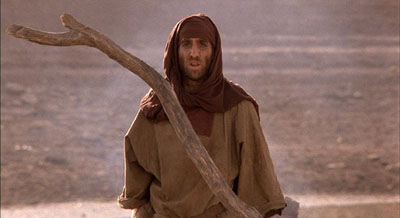
- This made it difficult for me not to hear the theme music for Fishing with John in my head whenever he's on screen, especially when he says, "I can just imagine in Galilee right now... the sea. They say the fishing's so good, you just touch the nets and the fish jump in."
- The DVD features production footage that Scorsese shot on videotape while on location in Morocco. There's one shot that should be very reassuring to all would-be directors:

- As someone murdered "Good Night, Irene" on an acoustic in the background, Scorsese pointed the camera at a mirror and recorded himself saying, "I wonder if this flickering red light means that we're taping?" So your YouTube diaries aren't so amateurish after all—or at least you're in good company.
- You probably know that Scorsese is a huge fan of Powell and Pressburger; he recorded a commentary track for The Red Shoes, and helped rescue Peeping Tom from obscurity. While making The Last Temptation of Christ, he was able to indulge himself with a few acts of fandom of his own. First, he had Leo Marks, the screenwriter for Peeping Tom, record the voice of Satan when he appears as a pillar of fire. Second, Michael Powell himself dropped by the studio while he was mixing the score with Peter Gabriel. This is right up there with the Big Three at Yalta:
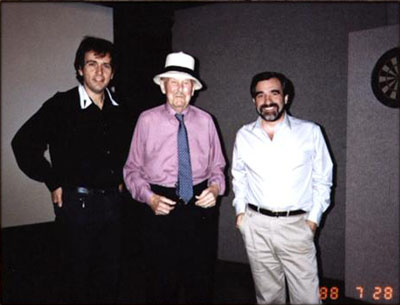
- I described Michael Ballhaus's cinematography as "painterly", and this is true, but sometimes his sources are unexpected. He expertly evokes Bosch during the Passion. Here's Bosch's Christ Carrying the Cross:
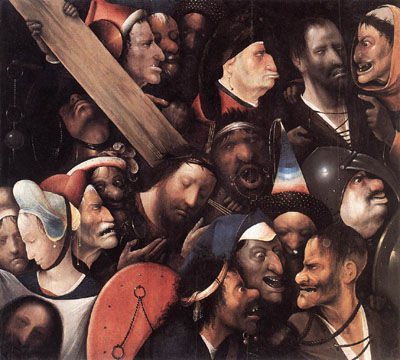
- And here's how Ballhaus renders it in 1.85:1:
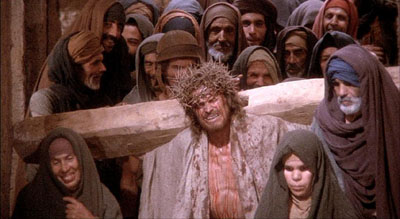
- I think that's a masterful both in choice of source material and execution. But in the same sequence, there's a baffling quote of Steve McCurry's Afghan Girl:

- Compare to the original:

- It's a nice version of the image (even without the startling greens of the original), but I'm not sure what it's doing there.
- One thing the film gets right (and most Biblical movies get wrong) is Christ's embrace of life during his ministry. Luke has people say of him, "Behold a gluttonous man, and a winebibber, a friend of publicans and sinners!" You would have to be seriously deranged to mistake any other Biblical Jesus for a gluttonous man or a winebibber, but The Last Temptation of Christ shows him as truly celebratory (which is not to say gluttonous or drunk) during the wedding at Cana. Besides that, the movie makes the unprecedented suggestion that, at least until the crucifixion, being Jesus may have been at times, well, fun. Here, he's raising a glass as his disciples discover that he's turned the jugs of water to wine:
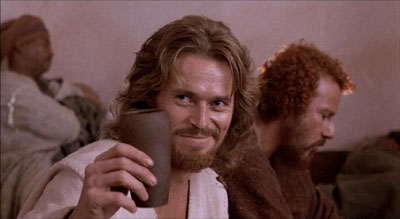
- I'm not a religious man, but if I were, that's the kind of messiah I'd want to follow.
2Most people were also convinced that Saddam Hussein helped plan the attacks of September 11.
3Simon of Cyrene is absent from this version of the story; the logic demands that Christ carry his own cross, since he carried others' at the beginning.
4The IMDB incorrectly has this as "Jerobeam."
5Not counting his visit there as an adolescent, which is not in the film. Note that some biblical scholars believe that the differences in the chronology of this event between the synoptic Gospels and John indicates that Jesus did this twice, as Scorsese has it.
6c.f. Milton. When Satan first sees Earth, "Such wonder seis'd.../ The Spirit maligne, but much more envy seis'd/ At sight of all this World beheld so faire."
7You can read an interesting post-mortem on the campaign against the film from the perspective of a fundamentalist here.
8The Gospel of Judas has Gnostic elements absent from The Last Temptation of Christ, but both share the idea of Judas as Christ's most faithful disciple, who betrayed him according to his instructions.
9This is nowhere near the all-time winner for bad biopic dialogue, from Max: "Come on, Hitler, I'll buy you a glass of lemonade."
10One of Gabriel's most effective tricks, c.f. "Mercy Street" and "Digging in the Dirt."


47 comments:
Another spot-on review. Thanks! I've never seen this movie or really known anything what it was about beyond the obvious, and now I want to see it -- it sounds terrific.
One thing though -- it's John Lurie, not James Lurie. But you knew that already.
Thanks, glad you enjoyed it. Re: James/John, all these J names confused me, but I've fixed it now -- good catch.
Jay Cocks, one of Scorsese's constant collaborators, and his wife, Verna Bloom (best known as Mrs. Wormer from ANIMAL HOUSE) both contributed to LToC (they mention the Writer's Guild brouhaha about why he wasn't credited as a writer on the commentary, I think.
Another fun fact: there's way, way too many overt religious parallels in Raimi's first SPIDER-MAN film. And who tempts Spider-Man on top of a cliff/building with all the riches of the world?
From Jesus to the Green Goblin in just fifteen years.
Nicely done! Thanks.
But it's Powell and Pressburger.
Ted,
They don't talk about the credits on the commentary that I remember -- I figured it had to be a WGA thing, since it was obvious that Cocks had worked on the script. I think the script that's online is Schrader's draft, but I could be mistaken. Do you know of any online press about the arbitration process? I looked but couldn't find anything.
I am not a big fan of the first Spiderman movie, but man did I like the second one.
Frank,
Nice catch -- it was late, &c., &c.. I've updated it.
Good review!
You mention over and over again "Scorsese's characters" or "Scorsese's theology," etc. Give the original author of the book Nikos Kazantzakis some credit here. Or at the very least Paul Schrader for the screenplay. Just because Scorsese directed it doesn't mean he should get credit for all of these other people's ideas.
CCBC,
Thanks!
Matt
Anonymous,
I agree with you on this, but it's a bit of a mess to write, because it's Kazantzakis, Schrader, Cocks, and Scorsese. Not having read the novel or screenplay (but knowing from the commentary that Schrader cut a lot of eastern theology from the novel, I don't know who to credit for what. I try to do a decent job to credit writers, but clearly in this case I've not given enough credit where it's due. Apologies--I may look this back over and try to be more precise.
Matt - Great review! Although it's present in many other of your reviews, this one in particular embodies a voice and tone that does what I think any great film assessment does: makes you want to immediately watch the film (again, in my case - been years).
Which, depsite the 6:30 AM time, I think I'll do!
Chris,
Glad you enjoyed the review—hope you liked seeing the film again after so long. I don't think I could watch it at 6:30, but then I also don't think I could do much of anything at 6:30.
Anonymous,
Ok, I tried to recast this more correctly -- there is no elegant way to write about a movie when you are not sure whose idea was what. Now, where it says Scorsese, I'm talking about something that I can definitely attribute to him, e.g., casting, shot framing, &c. It's an interesting style problem and I think I'm going to as John August about it (he addresses stuff like this on his website). & it's one of those things like masculine/feminine pronouns, where no solution is perfect. What I ended up doing was more often using the film as a possesive noun (e.g., "The film's theology"), which is not ideal, but unless I can attribute particular ideas to particular authors who were involved (which I can't, since I haven't read the book or screenplay), it seems preferable to listing all four names each time.
Scorcese's 'spiritual' films (LTOC, Kundun, Bringing Out the Dead) are seriously underappreciated. Thanks for a great review!
John August was kind enough to answer my question, and one of his commenters (Jeff) posted a more elegant solution than using the film as a possessive: using "the filmmakers." Sometimes that won't be the right solution either, obviously. Anyway, if you're interested in the issue of who to credit for what when writing about a movie, you could do worse than to check out the post and subsequent discussion here.
Great review, but I think you've missed the point of The Da Vinci Code not getting criticized. It did receive a lot of criticism for it's message. Being a multi-million dollar Tom Hanks/Ron Howard blockbuster doesn't figure into it as much as one might think.
The reason The Da Vinci Code got off so easily is that it was so silly. It's hard to get truly upset with The Da Vinci Code because it's one man's ideas with little to know factual basis for his theories.
The Last Temptation of Christ is genuinely challenging people's faith, by presenting a potentially more realistic view of Christ as a human. Temptation has some basis in the Bible. It wants people to examine their church, their faith, and themselves.
If I were a religious leader, I know which I would attempt to suppress.
Comparing religious fantatics to comic book fanboys: brilliant!
Geoff,
My embarrassing confession: I have not seen Kundun or Bringing Out the Dead. Back to my Netflix queue for me!
The Dave,
I'm going to have to disagree with you on this. I think you would find more people who believe the conspiracy in The Da Vinci Code is real than anything about The Last Temptation of Christ. For evidence, I offer the sub-genre of Da Vinci Code books that tell you "the truth." One Amazon search reveals:
Breaking the Da Vinci Code
The Truth Behind the Da Vinci Code
Truth and Fiction in The Da Vinci Code
Rejecting The Da Vinci Code
Cracking Da Vinci's Code
Da Vinci Decoded
Decoding Da Vinci
Secrets of the Code
Beyond the Da Vinci Code
The Da Vinci Hoax
And many more. And I've had conversations with people who were "intrigued" by the book's ideas, &c. So I think many people have less sense of what's rubbish than you give them credit for. And yet very few people argued that the book or film should be outright suppressed, which happened with both the book and film of The Last Temptation of Christ. Or is your argument one of tone—that The Last Temptation of Christ looks like a serious film, and is thus more likely to be seen as dangerous than a big-budget thriller?
I do think tone is part of it, but that wasn't my argument. Viewers will take a movie seriously if they want to regardless of how seriously the movie takes itself. How else can one describe the negative reaction to Life of Brian?
Before going on I'll admit I haven't read either book, but I have seen both movies (in one case, unfortunately). Keep that in mind in case it would affect my argument.
I am very aware of the affect The Da Vinci Code had. I've seen the books and the signs outside churches announcing this week's sermon as "Cracking The Code." I work at a theater where a customer declared us "a target" simply for having the poster on display. So, yeah. I get that people were worried about it.
I'll concede that maybe more people believe The Da Vinci Code than I realize. I doubt that any of them were believers in Christianity in the first place. You need to drop the most fundamental belief of Christianity (Jesus is divine) to accept the premise. If the movie had a single argument that wasn't based on pure speculation, then it might be convincing. It's entire plot is based on, "It may sound crazy, but what if..." Anyone swayed by it all ready built their proverbial house of the proverbial sinking sand.
Once I saw The Da Vinci Code, I knew it was written for skeptics. The anti-Code books are, therefore written for believers. That's why The Da Vinci Code doesn't need, and didn't get, people protesting the way Last Temptation did. What's to protest? A movie based on conjecture? Why bother.
Last Temptation could be seen a "dangerous" to Christianity because it might actually sway some minds. The heresies within Last Temptation are plausible within the realm of Christianity. Some of Last Temptation comes from the Bible. The people that don't know the Bible will have trouble discerning what is God's word and what is the filmmaker's word. I see Christian leaders expecting the domino theory of question one facet and you'll question them all.
I can't say I've discussed The Da Vinci Code's ideas at length with anyone. Maybe I'm being optimistic in regards to how much credit the masses deserve (which is the first time anyone's ever said that about me). I only know two people that read, or admitted reading The Da Vinci Code and neither were all that intrigued with Brown's ideas. I'd say his ideas could only be intriguing in the most basic theoretical sense of "Was Jesus really the son of God?" which is hardly a Brown original.
Of course, I don't think anyone protesting either was familiar with the work they were protesting. Maybe my entire argument is moot.
The Dave,
Okay, I see your argument more clearly now. I have read the book of The Da Vinci Code but not seen the movie, and I think that is the cause of our misunderstanding. The book has a section titled "Front Matter" which purports to give the historical basis for the story. It begins:
"FACT: The Priory of Sion—a European secret society founded in 1099—is a real organization. In 1975 Paris's Bibliothèque nationale discovered parchments known as Les Dossiers Secrets, identifying numerous members of the Priory of Sion, including Sir Isaac Newton, Botticelli, Victor Hugo, and Leonardo da Vinci.
...
All descriptions of artwork, architecture, documents, and secret rituals in this novel are accurate."
The film probably soft-pedals this, but Brown definitely presents the book as a meticulously researched historical document, closer to Crichton's popularizations of science than the absolute nonsense they clearly are.
I bet you know more than two people who've read the book; it's like Reagan. Maybe nobody you know voted for him, but everyone you don't know did.
What movie was the customer who declared you "a target" there to see?
Wow. I wasn't aware of Brown's claims of historical accuracy. It's like finding out whoever wrote National Treasure did "research" on the subject. I'll give him credit for having balls.
I probably do know more than two people that read The Da Vinci Code. Someone was buying all those copies and I'm bound to know more than a pair of them. I guess I've been lucky to avoid literary conversation with those people.
I don't remember what the person claiming we were a target was coming to see. We get several movies a year targeted toward Christians (One Night with the King, The Ultimate Gift, Omega Code, etc.) so it could have been one of those. It might have been Wedding Crashers for all I remember. I was quite amused with the whole thing. It made the movie seem that much more interesting.
Wow—I knew that there was an underclass of Christian-targeted movies that studios (except for Fox Faith) largely left alone, and I watched and loved The Omega Code for many of the wrong reasons, but I'd never heard of One Night With The King. Getting Peter O'Toole and Omar Sharif back on film together: kudos. Where is the theater you work at?
I work at a theatre in Indianapolis, Indiana. I've noticed that we've had fewer of the Christian targeted movies this year unless one counts Evan Almighty. I think it's because they do absolutely no business.
I wouldn't work to hard to find One Night With The King. The guy I know that saw it, a minister, didn't seem too impressed. Peter O'Toole's part was apparently limited to one scene. Omar Sharif's part, if I recall correctly, was small as well. I'd have to ask, but I don't know if they shared any screen time. Their names were, along with possibly John Rhys-Davies, the most prominent on the poster. The cast alone almost got me to see the movie until I heard how little the two "stars" were in it.
The Dave,
All right, I won't bother to watch it. I don't think of Indianapolis as being red state territory but I suppose anything that's not New York or Los Angeles gets blitzed by that kind of stuff. Hope Shariff and O'Toole got paid well, at least -- it reminds me of the cover of the DVD for Infernal Affairs, which features an actress who is onscreen for all of two minutes.
Indiana is very red state. My guess is Indianapolis is the most liberal part of the state. I don't think we've voted democrat since FDR and he won virtually every state.
I don't consider us part of the Bible Belt, but that perception probably depends on your proximity to us.
Also, I'd add you're mixing Christianity and conservatives, but that's understandable during the last few years.
Dave,
Guilty as charged re: Christianity and conservatives, but like you said, it's an understandable mistake right now.
A very eloquent review. But it occurred to me, the last temptation was Jesus seeing himself married with a couple of kids... no wonder he decided to stay crucified.
Jake,
Pleae find a better way to spend your time.
Matt
Afgan Girl seems to just be an image that Scorcese and Balhaus thought really evoked the ancient world. Not too complicated.
Y'know they found that girl again in 2002 or something? Life under the Taliban had engraved itself in some serious worry lines on that lovely face.
JJ,
See, to me, Afghan Girl mostly just evokes National Geographic...
Excellent review. Believe it or not, growing up a New York Jewish kid on the Upper East Side, this movie was my first exposure to Christianity. When I finally got to a religious studies class in high school, I was all, "Wait, so Jesus didn't tell Judas to go get the Romans???" That was embarrassing.
Adolescent cinephilia and an early love for Scorsese, who was still in his prime, prompted me to rent it when I was about 14, and to keep going back to it year after year. A film professor later criticized it for its Cormanisms, but there's something to be said for viewing a movie independent of its production context (that's what I did as a kid, so I managed to interpret the bare sets and dry production values as representative of the times -- it was the desert after all).
Anyway, one of my all-time favorites. It's a profound story, in the end, about humanity.
Matthew,
This is the most extraordinary breakdown and analysis of this extraordinary film. You do your homework and thoroughly back yourself up on every level. A man after my own heart.
I was working at Universal Cineplex as an usher when this movie was released in a very hot August in '88 and it was a nightmare; thousands of protesters, even a man laying on a cross screaming in agony as a badly dressed centurion pretended to drive a nail into his hand. I was tempted to go up to them, take the nail and hammer from the Roman, say "No, this is how you do it..." and really drive one in. But I didn't, of course.
I've always wondered if Scorcese didn't pattern Last Temptation after Renoir's The River, because his pacing and editing are almost identical to Renoir's classic.
Anyway, great great review. I'm going to revisit the dvd this evening!
Thanks,
Sean
I think your comments would be improved by adding a date stamp, rather than just a time stamp. It would help understand the flow of a conversation thread over time.
Anonymous,
That's odd--I thought it did. I'll look into it.
Dude, great review. I really admire what you do. I own a few of criterion films myself, they're great series, although I don't understand how movies like Armaggedon and The Rock can be among amazing films like Beauty and the Beast, Fanny and Alexander, In The Mood for Love, etc.
I have a blog with movie reviews too, it's in spanish, I'm from venezuela.
http://almasycinefilo.blogspot.com/
In fact, my internet name is Almasy, like the character in the movie The English Patient, one of my favorite movies of all time.
Wish you best of luck in your endeavour.
Who's Jake?
Anonymous,
A kid who kept posting comment after comment asking me to upload the movie to YouTube. Like three or four a day. Also, he's the reason that comments are now approved before they post.
A kid? The reason why? I have no idea what you mean.
I've heard of Youtube. But I don't know about a kid with that name on a blog like this.
Plus, what you just posted, ''a better way to spend your time'', I don't know what that means.
Plus, what you just posted, ''a better way to spend your time'', I don't know what that means.
How could this so-called ''Jake'' be the reason for this? Three or Four a day? I don't get it.
Matthew, are you there?
I'm just asking how Jake was asking you about this film.
Can you tell me how it all started, and why he's the reason for this?
Thanks!
I've been reading reviews I've skipped before and re-reading some (like this one) that I enjoyed. Anyway, I finally took a look at "The Last Temptation Denied" site that you linked and found it fascinating. There are some (to me) silly arguments there but one complaint is that Scorsese/Universal did not have a screening for Evangelicals with a promise to change the film to meet with their criticism. If that sounds, um, presumptious, then perhaps it is due to the fact that the Evangelicals thought that Universal was promising them a "faith-affirming" film. The Evangelicals wound up believing that they had been conned. The site's authors read Kazantzakis before the movie's release so they had an idea about the heresies it would illustrate. And, in fact, they give a pretty good breakdown of Kazantzakis' beliefs. Although they don't mention The Gospel of Judas, as you did, they do speak of Kazantzakis' "Saviours of God" thesis that human beings create divinity. Whether or not they (or I) have it correctly is another matter but they make the point that Scorsese's film is true to Kazantzakis' book (and I say hooray for that!) The Evangelical site authors are most appalled by Jesus as sinner, not in the sex scene so much as in his blasphemy and opposition to God. In fact, they seem to say that the furor over Jesus-sex was invented by the media. At any rate, they get the message, they just hate it!
I found the comments about DaVinci Code in this thread very interesting. I have often wondered how some who accepts the Revelation of John as divine truth could allow (or even watch) all those 666/Stop the Apocalypse films. I mean, I can't watch them but that's because I think they're stupid, not blasphemous. (BTW, I do think the original Exorcist was a good good movie.)
Can you tell me who Jake is? I just want to know what he was doing on here.
You always did have more bowls than brains.
Just wanted to add my own note of appreciation for this post. I recently watched LToC and, as I often do when I watch something by myself, went to the Web looking for a sense of shared experience. But as you say, it's hard to find thoughtful responses to this film amid all the diatribes by folks who've likely never seen it. I really appreciated this post on many levels, both as a film studies person and as someone who experienced the movie as a wonderfully challenging meditation on faith and the human condition.
Great review!
We're linking to your review for Censored Cinema Wednesday at SeminalCinemaOutfit.com
Keep up the good work!
Post a Comment